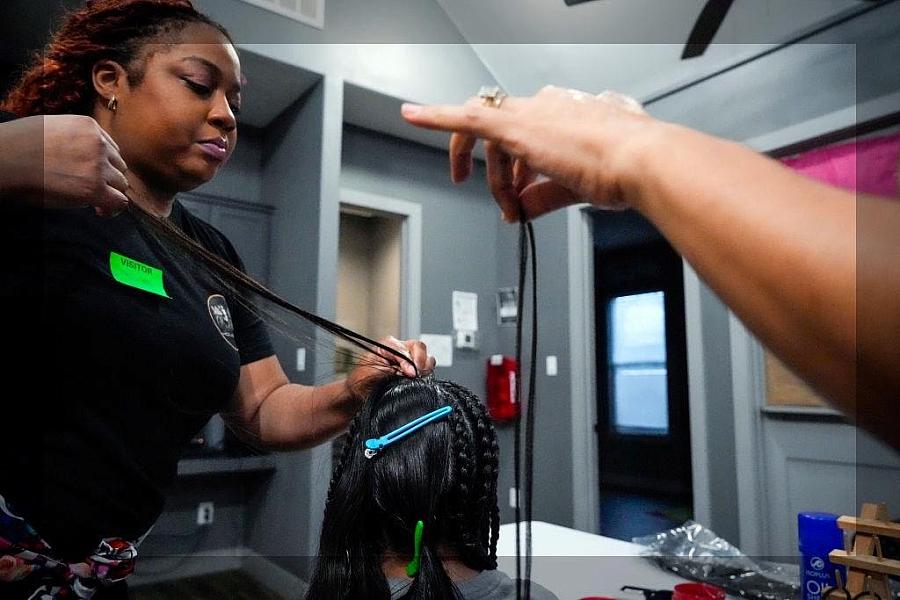The Health Divide: Are hair products marketed to Black women a public health threat?

Brett Coomer, Houston Chronicle via Getty Image
In February, testing by Consumer Reports revealed that cancer-causing ingredients and lead were present in the most popular synthetic hair products used by Black women. The findings have put fresh scrutiny on the synthetic hair market, a $2.7 billion industry.
Growing up, I remember seeing advertisements for Black hair care products in Jet and Ebony magazines.
The "Duke Style of the Week" ads often featured Black men proudly showcasing impressive Afros. Ads for Madam C.J. Walker targeted Black women and frequently offered tips for achieving fuller, longer, and stronger hair, while the “Jet Beauty of the Week” always showcased the latest hairstyles.
Black people’s hair has always sparked debate.
Natural styles were not accepted by mainstream society, and many Black people felt the pressure to conform to white beauty standards, which meant straightening their naturally coily, thick hair to gain acceptance. Many used harsh chemicals like lye in hair relaxers to achieve this look.
But the health threat posed by popular hair products has flown under the radar. The latest test results and heightened political attention on the role played by chemical exposures and toxins could start to change that.
Most top hair brands contained lead
Synthetic hair is commonly used in wigs and sew-in extensions that can last for months. The artificial hair and braiding market is booming and expected to reach sales of $6.3 billion a year by 2029.
Brands like Sensationnel, Magic Fingers, Shake-N-Go, Debut, and Darling all tested positive for carcinogens and other volatile organic compounds (VOCs), including benzene, a known cancer-causing ingredient, and acetone, according to Consumer Reports testing.
The report also identified methylene chloride, which the EPA states can cause liver and lung cancer with long-term exposure. (The Food and Drug Administration prohibits any level of methylene chloride in cosmetics.)
According to the report, nine out of the 10 brands tested positive for lead, including one package of braiding hair that exceeded the maximum allowed dose of lead by more than 600%.
Lead exposure in adults can cause massive health problems, including hypertension, kidney damage, reproductive dysfunction, and neurological disturbances. In children, no amount of lead is safe, and lead poisoning can harm a developing brain and nervous system. Lead has also been linked to behavioral problems.
“Synthetic braids are typically worn for about four to six weeks. This means that Black women and others who use synthetic hair are consistently exposed to the ingredients in these products during that time,” said Chrystal Thomas, a student at the Albert Einstein College of Medicine and The City University of New York, in an interview with Consumer Reports.
As part of her public health coursework, Thomas began researching potential health issues related to braiding hair. She published her findings in a commentary article in The Lancet Regional Health – Americas about the risks of carcinogenic materials in hair products for Black women.
Black women are the primary users of these products. In 2022, 34% of adult Black female internet users in the United States reported wearing braids with synthetic extensions within the past three years.
In her Lancet commentary calling for more government regulation of hair products, Thomas writes that “exposure to harmful ingredients in synthetic braids is likely creating an underrecognized and unaddressed public health issue for Black communities.”
The history of Black hair
Black hair has captivated the attention of white people since enslaved individuals were brought to America.
In early literature and cinema, Black hair was often depicted as “nappy” and “unruly,” and portrayed as something that needed to be tamed. Many Black women had their heads shaved bald or were forced to conceal their hair under tattered rags, stripping them of their cultural identity.
That historical legacy of discrimination lingers. Black men and women often feel compelled to alter their natural hair to secure jobs, and Black women are 1.5 times more likely to be sent home from the workplace because of their hair, according to the CROWN Coalition.
Such discrimination against Black hair has prompted 27 states to enact laws prohibiting discrimination based on an individual’s hair texture or hairstyle.
Reporting angles abound
In the wake of the recent health risks associated with these hair products, there’s much more reporting to be done. How is the synthetic hair market regulated — or not — by the FDA? Should the hair come with a warning? In California, Proposition 65 requires businesses to provide consumers with warnings if certain chemicals known to cause cancer or birth defects are present. Do such state laws afford offer meaningful warnings or protection against the toxins in these hair products?
Also, now that we know nine out of 10 of the most popular brands contain lead, what should be done to keep children from wearing this synthetic hair? Do parents know the risk?
These are all questions worthy of diligent reporting, especially by outlets serving Black communities, where such information could lead people to rethink their use of such products.
This is a story that needs to get out, and Black women need to know that the hair they are wearing could be harmful to their health.

